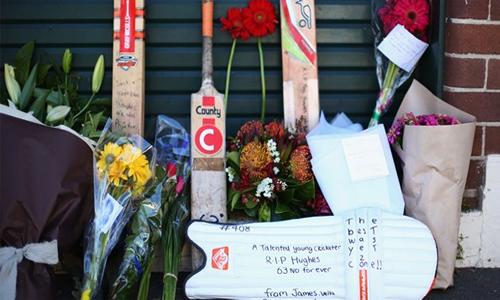Safety in focus, one year after Hughes tragedy
On the first anniversary of the tragic death of Australian batsman Phillip Hughes, questions are being asked about safety -- and the new pink ball being used at this week's historic day-night Test.
Hughes, who played 26 Tests, died from bleeding on the brain on November 27 last year after being hit on the base of the skull by a rising ball at the Sydney Cricket Ground during a domestic match.
His death -- a freak accident -- stunned Australia and the world cricket community, sparking an outpouring of grief.
While Cricket Australia immediately boosted the medical presence at grounds and now requires all players to wear a helmet that meets certain safety standards, Hughes' long-time coach and mentor Neil D'Costa said he was still not convinced it was enough.
"Safety is our absolute top priority and I'm not sure we're doing everything humanly possible to honour Phillip's memory," he told Thursday's Sydney Morning Herald.
"You can erect plaques, and that's all nice, but when it's said and done, are we doing everything we can to make sure it doesn't happen again to someone's child?"
The anniversary of Hughes' death on Friday coincides with the start of the first day-night Test between Australia and New Zealand in Adelaide -- featuring a new pink ball, which can generate extra swing at night.
D'Costa warned the situation could pose safety problems, especially with bowlers like Mitchell Starc, who clocked the fastest ball in Test history during the second Test in Perth.
"If a team would forego runs to declare and take that condition (extra swing at night) and see that as an advantage to win the game, you have to think it's a bit extreme," D'Costa said.
"They wouldn't want to see someone get hit with that pink ball at dusk on international television. They're facing the fastest bowler in the world now -- it should mean something."
Former Australian opener Chris Rogers, who retired following the recent Ashes series after experiencing ongoing symptoms of concussion, said the clip-on neck guard should be made mandatory in all helmet designs to counter the risk.
"The introduction of the neck guard, I think that has been quite big so I do think it should be made compulsory," he told the newspaper.
"A lot of guys might not feel comfortable wearing it initially, but it's for the safety of everyone. The laws could be tougher and more stringent."
Photo : starsports.com
Related Posts

